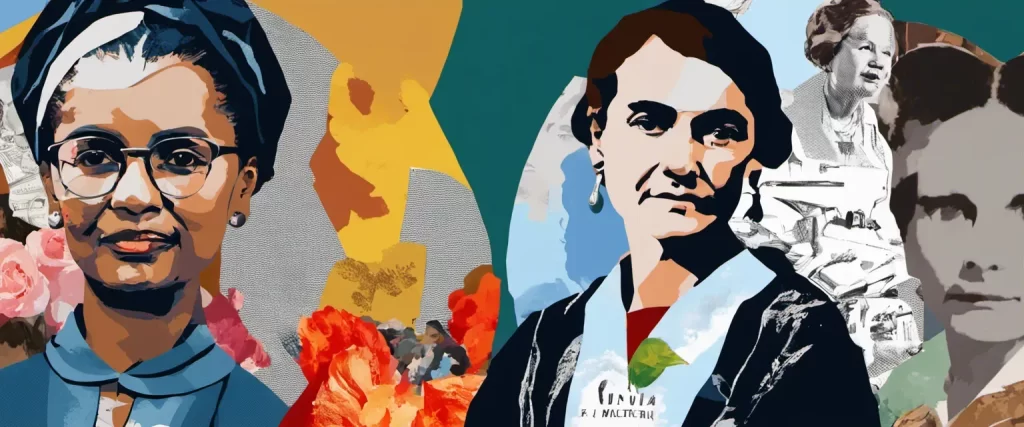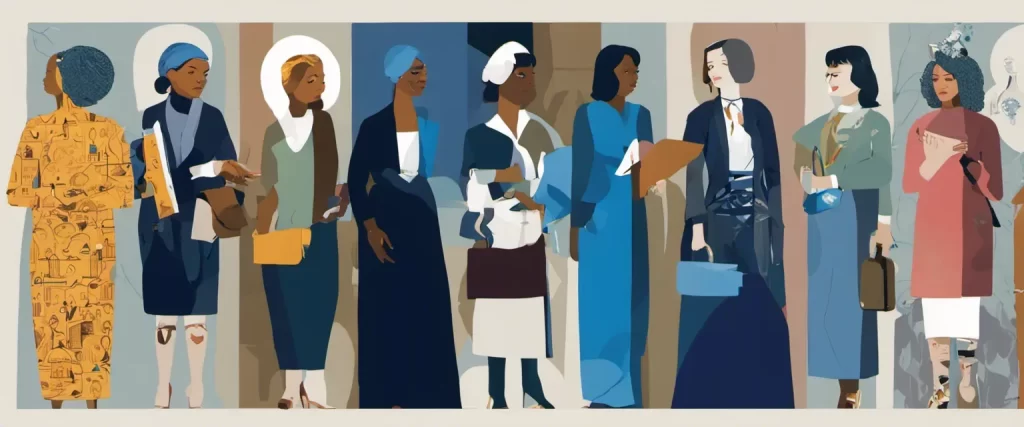
What is Great Women
“Great Women” is a term used to refer to influential and accomplished women who have made significant contributions in various fields, such as politics, science, arts, literature, sports, and activism. These women are known for their achievements, leadership, and impact on society, often breaking barriers and challenging gender norms. The term celebrates and recognizes the accomplishments and contributions of women throughout history.
What Can We Get From Great Women?
From great women, we can get inspiration, empowerment, and a greater understanding of what women are capable of achieving. They can serve as role models, demonstrating that women can excel in various fields and break barriers. Great women demonstrate strength, resilience, and determination, inspiring others to believe in themselves and their own potential. They also contribute to the progress of women’s rights and gender equality, advocating for equal opportunities and challenging societal norms. Their achievements and contributions pave the way for future generations of women, creating a more inclusive and equal society.
Strategies in Learning Great Women
1. Start with a comprehensive list: Begin by creating a list of prominent and influential women throughout history. Include women from various fields such as politics, literature, science, art, and activism. This list can serve as a roadmap for your learning journey.
2. Read biographies and autobiographies: Biographies and autobiographies provide detailed insights into the lives and accomplishments of great women. Choose books that focus on women who inspired you or have made significant contributions in areas of your interest.
3. Dive into documentaries and films: Watch documentaries and films that depict the lives and achievements of great women. This visual medium can bring their stories to life and offer a deeper understanding of their struggles and triumphs.
4. Engage in focused research: Select a few women who interest you the most and conduct research on them. Look for interviews, articles, speeches, and other resources that highlight their ideas, experiences, and contributions. Take notes of key information and connections to facilitate better understanding.
5. Seek out educational courses or lectures: Many online platforms offer courses or lectures focused on the lives of great women. Enroll in classes that interest you and provide a structured learning experience. These courses often include readings, discussions, and assignments that enhance your understanding and critical thinking skills.
6. Join clubs or discussion groups: Engage in conversations with others who also appreciate and want to learn about great women. Join clubs or discussion groups centered around women’s history, feminism, or specific women’s accomplishments. This allows you to exchange ideas, gain new perspectives, and deepen your knowledge.
7. Create visual aids: Develop visual aids such as timelines, infographics, and mind maps to help visualize the connections between various women and their achievements. This can assist in retaining information and seeing the broader impact of their work.
8. Visit museums and exhibitions: Many museums have exhibitions dedicated to the lives of great women. Take the opportunity to visit these spaces and learn more about their contributions through curated displays, artifacts, and interactive exhibits.
9. Connect with living role models: Attend workshops, conferences, or events where you can meet and learn from living great women. Engage in discussions, ask questions, and seek guidance or mentorship from those who are making a difference in your field of interest.
10. Reflect and apply their lessons: Finally, reflect on the lessons, challenges, and achievements of the great women you have learned about. Consider how their stories and perspectives can inspire and inform your own actions, goals, and endeavors. Apply their lessons to your own life and work towards creating positive change in your community.

Agatha Christie by Agatha Christie
Summary
Agatha Christie is an autobiography written by the famous British author Agatha Christie herself. In this book, Christie reflects on her life, sharing her personal and professional experiences.
The book begins with Christie’s childhood and early years, her love for storytelling, and her discovery of her passion for writing. She recounts her early attempts at writing and the struggles she faced in getting her work published.
Christie also delves into her personal life, discussing her relationship with her first husband, Archibald Christie, and their daughter, Rosalind. She also shares her experiences as a nurse during World War I, which greatly influenced her writing and provided her with valuable insights into human behavior.
The book further explores Christie’s writing process, sharing her inspirations, techniques, and challenges throughout her career. She discusses some of her most famous works, including the creation of beloved characters like Hercule Poirot and Miss Marple.
Christie shares anecdotes about her interactions with publishers, fellow authors, and readers, giving readers a glimpse into the world of a successful writer. She also reflects on the impact of her books on readers around the world and the lasting legacy she has left behind.
Overall, Agatha Christie provides an intimate look into the remarkable life and career of one of the most renowned authors in literary history, offering insights into her creative process, personal life, and the enduring appeal of her works.
Reasons for Recommendation
1. Insight into a pioneering female author: Agatha Christie was not only one of the most successful and acclaimed British authors of all time, but she also broke numerous barriers and paved the way for other women in the field of crime fiction. This book provides readers with an in-depth look at her life and career, showcasing her as a great woman who made significant contributions to literature.
2. Inspiration for aspiring writers: Agatha Christie’s journey as a writer, her persistence, and her ability to captivate audiences for decades can serve as a powerful source of inspiration for aspiring female authors. This book highlights her achievements, struggles, and the unwavering dedication she had towards her craft, instilling a sense of empowerment in women who wish to pursue a writing career.
3. Exploration of gender dynamics and societal expectations: Agatha Christie’s works often delved into complex gender dynamics, challenging traditional stereotypes and societal expectations placed upon women. This book offers valuable insights into her unique perspective on gender roles, female empowerment, and the challenges faced by women in a male-dominated society. Readers interested in feminist literature or studying historical cultural norms will find this book particularly intriguing.
4. Celebration of a female role model: Agatha Christie’s immense success as a female author during a time when women faced numerous obstacles is worth celebrating. This book provides a comprehensive view of her accomplishments, shedding light on her determination and perseverance. It serves as a reminder to women that they can overcome societal constraints and achieve greatness.
5. Examination of the impact of Agatha Christie’s work on the literary and cultural landscape: Agatha Christie’s influence extends far beyond her works themselves. This book explores the significant impact she had on crime fiction, popular culture, and even the portrayal of female characters in literature. By understanding her contributions, readers gain a better appreciation for her role in shaping the literary world and inspiring future generations of writers.
6. Exploration of the psychology of a great female protagonist: Agatha Christie’s books often feature strong and intelligent female protagonists, challenging the notion that women are mere damsels in distress. Through this book, readers can gain a deeper understanding of the psychological complexities of Christie’s female characters, providing further evidence of her ability to create compelling and inspiring women in her stories.
7. Window into the social and historical context of women’s lives: Agatha Christie’s life and writing career spanned different eras, each presenting unique challenges and opportunities for women. This book provides valuable insights into the historical context in which she lived, shedding light on the evolving roles and expectations of women during her lifetime. It serves as an important resource for those interested in understanding the changing societal dynamics from a female perspective.

Isabella by Kirstin Downey
Summary
“Isabella: The Warrior Queen” by Kirstin Downey is a biography that tells the inspiring and captivating story of Isabella of Castile. Through meticulous research and engaging storytelling, Downey explores Isabella’s journey from a young and ambitious princess to becoming one of the most influential and powerful rulers in the history of Europe.
The book delves into Isabella’s upbringing, highlighting her education, family dynamics, and the tumultuous political landscape of late medieval Spain. Downey showcases Isabella’s determination and intelligence, which allowed her to overcome numerous obstacles in her quest for power and the unification of Spain.
Isabella’s marriage to Ferdinand of Aragon marked the beginning of a powerful and strategic alliance that would prove vital in their mission to reclaim the Iberian Peninsula from the Moors. Downey chronicles their successful military campaigns, revealing Isabella’s bravery on the battlefield and her strategic acumen in leading her troops.
Beyond her military victories, the biography portrays Isabella as a devoted and pious Catholic, driven by a zealous desire to spread her faith. Downey explores how Isabella’s religious fervor influenced key decisions, such as the expulsion of Jews and Muslims from Spain and the infamous Spanish Inquisition.
The biography also provides insights into Isabella’s personal life, delving into her complex relationships with her husband, children, and other influential figures of the time. Downey paints a nuanced portrait of Isabella, showing her as a compassionate ruler who aimed to improve the lives of her subjects through social reforms and economic development.
However, the book does not shy away from addressing the controversial aspects of Isabella’s reign, including the aforementioned religious intolerance, the treatment of indigenous peoples during the colonization of the Americas, and her role in the brutal Spanish conquests.
Overall, “Isabella: The Warrior Queen” offers a comprehensive and balanced account of the life of this remarkable historical figure. Downey skillfully presents Isabella as a multifaceted woman whose determination, ambition, and devotion shaped not only her own life but also the destiny of an entire nation.
Reasons for Recommendation
As an AI language model, I can provide you with some reasons why you might recommend the book “Isabella” by Kirstin Downey, highlighting its significance from the perspective of great women. Here are a few points to consider:
1. Inspiring Female Protagonist: “Isabella” focuses on the life and accomplishments of Isabella of Castile, a powerful queen who played a crucial role in shaping the modern era. For women looking for a strong, influential female figure to appreciate and be inspired by, Isabella’s story serves as a guiding light.
2. Historical Significance: Isabella’s reign as queen of Castile and Leon marked a pivotal period in history. Her determined pursuit of unifying Spain, religious reforms, and support for exploration laid the foundation for the subsequent Age of Discovery. This book provides valuable insights into the historical events and decisions shaped by Isabella’s power and influence.
3. Empowerment Through Femininity: Isabella’s success and achievements challenged traditional gender roles and stereotypes of her time. By examining her life, readers can explore how she leveraged her femininity to exert power in a male-dominated society. This can provide valuable lessons for women seeking to navigate patriarchal environments while maintaining their authenticity.
4. Cultural Impact: Isabella’s patronage and support for art, literature, and education had a lasting impact on Spanish culture. By learning about her contributions in these areas, readers can gain a deeper understanding of how influential women like Isabella shaped the arts and humanities, often underappreciated or overlooked in historical narratives.
5. Political Savvy: Isabella skillfully navigated complex power dynamics during her reign, forging alliances and leading Spain into a new era. Her story highlights the importance of political acumen and adaptation, crucial skills for any woman seeking to make an impact in traditionally male-dominated arenas such as politics.
6. Legacy of Strength and Perseverance: Isabella faced numerous challenges and setbacks throughout her life but demonstrated tremendous resilience. Her story serves as a testament to the strength and determination of great women, encouraging readers to persevere even in the face of obstacles.
By recommending “Isabella” from the perspective of great women, readers can learn from Isabella’s life and accomplishments, gaining inspiration and a deeper understanding of the significant contributions made by women throughout history.
Victoria The Queen by Julia Baird
Summary
Victoria The Queen” by Julia Baird is a comprehensive biography that explores the life and reign of Queen Victoria, the longest-reigning monarch in British history. The book delves into Victoria’s early years, her ascension to the throne at the age of eighteen, and her subsequent rule of the British Empire for over six decades.
Baird presents a vivid and multifaceted portrait of Victoria, shedding light on her complex personality, her relationships with her family and advisors, her struggles with personal grief and loss, and her significant political impact. The biography explores Victoria’s numerous accomplishments and challenges, including her role in shaping the modern monarchy and her influence on social and cultural developments during the Victorian era.
Baird also delves into the Queen’s personal life, notably her passionate marriage to Prince Albert and the profound impact of his untimely death on her. She examines Victoria’s personal growth and transformation, from a young queen heavily influenced by her advisors to a formidable leader making her own decisions.
Throughout the book, Baird provides insight into the historical context of Victoria’s reign, including social, political, and technological changes, as well as the expansion of the British Empire. She explores Victoria’s relationships with key figures of the era, such as Prime Ministers William Gladstone and Benjamin Disraeli, and her interactions with influential figures from around the world, highlighting her ability to navigate diplomatic waters.
“Victoria The Queen” offers readers a rich and nuanced understanding of Victoria’s life, presenting her as a complex and influential monarch who played a significant role in shaping British and global history.
Reasons for Recommendation
1. Inspirational Female Role Model: “Victoria The Queen” chronicles the life of one of history’s most influential and powerful women. Queen Victoria’s reign lasted for over six decades, making her the longest-reigning British monarch at the time. From a female perspective, she represents a trailblazer in a male-dominated world, serving as a shining example of resilience, strength, and determination.
2. Historical Perspective: Julia Baird’s book provides an in-depth exploration of Victoria’s life, delving into her personal triumphs, struggles, and significant contributions. For women interested in history, this biography offers a unique perspective on the challenges faced by women in the 19th century. It highlights the progress that has been made over time and serves as a reminder of the long road ahead for gender equality.
3. Female Leadership and Empowerment: Queen Victoria demonstrated exceptional leadership skills during her reign, navigating through political and societal challenges while maintaining her own identity and values. By showcasing her journey, “Victoria The Queen” fosters a sense of empowerment among female readers, encouraging them to embrace their own voices, ideas, and leadership potential.
4. Lessons in Overcoming Adversity: Victoria faced numerous personal and professional setbacks throughout her life, yet she managed to maintain her resilience and determination in the face of adversity. This book provides valuable lessons for women on perseverance, self-belief, and resilience, inspiring readers to overcome their own challenges with strength and grace.
5. Feminist Themes: The biography explores the complexities of Victoria’s feminism and her role in shaping women’s rights during her reign. Readers interested in feminist literature will find this book particularly compelling, as it not only sheds light on Victoria’s personal beliefs but also examines the broader social and political context of women’s rights during the Victorian era.
6. Insight into Female Relationships: The book delves into Victoria’s relationships with other influential women, such as her daughters and her close friends. By exploring these relationships, the biography offers insights into the unique bonds that can be formed between women and emphasizes the importance of female support networks.
7. Reigning during Times of Change: Victoria’s reign coincided with significant societal, scientific, and technological advancements. This biography gives readers an understanding of how Victoria navigated through these changes and contributed to shaping the modern world. It emphasizes the pivotal role women played during transformative periods and highlights the importance of their contributions.
Ultimately, “Victoria The Queen” provides a comprehensive and nuanced account of Queen Victoria’s life, showcasing her impact on history and offering valuable lessons for women seeking inspiration, empowerment, and a deeper understanding of female leadership.